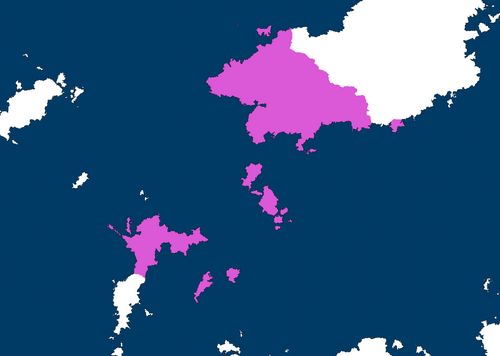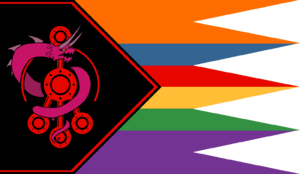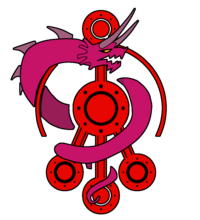The Amarian Combine: Difference between revisions
No edit summary |
No edit summary |
||
| Line 35: | Line 35: | ||
The Amarian Combine is a federative parlamentary authoritarian republic composed of the nations of [[Umetuč]], [[Alftheimn]] and [[Aucuses]]. The Combine is directly governed by the Umetučite President, who assumes the title of Head Coordinator, and ministers from all member states. Combine's authority regards national defense, economic affairs, foreign politics and education. The Combine has the capability to make directives regarding areas under its control that must be followed by member states. The three members, however, have the possibility to self governate and enforce state laws as long as they do not conflict with Combine directives. | The Amarian Combine is a federative parlamentary authoritarian republic composed of the nations of [[Umetuč]], [[Alftheimn]] and [[Aucuses]]. The Combine is directly governed by the Umetučite President, who assumes the title of Head Coordinator, and ministers from all member states. Combine's authority regards national defense, economic affairs, foreign politics and education. The Combine has the capability to make directives regarding areas under its control that must be followed by member states. The three members, however, have the possibility to self governate and enforce state laws as long as they do not conflict with Combine directives. | ||
===Military=== | ===Military=== | ||
Each member of the Combine has a separate army (considered "departments" of the Amaraian Armed Forces) that can be used for state specific endevours. However, the individual armies are organized and administrated by Amarian officers who also command and lead the troops in times of war. Singualr aramies can be called by the Amarain administration at any point and must cease any other activity they were occupied in to respond to the Combine's call. To limit abuse of this ability, tha Combine can only summon armies in times of war or national emergencies. A similar system is used for the Amarian Navy. | |||
===Foreign relations=== | ===Foreign relations=== | ||
In 2408, The Amarian combine is a founding state of the [[Transnational Assembly]] (formerly known as the [[South Sea Bottling Group]]) and is a member of the [[International Fueling Treaty]] since 2407. | |||
==Economy== | ==Economy== | ||
Revision as of 17:07, 10 May 2023
The Amarian Combine (colloquially Greater Amaria or The Combine) is a federation between the three Sonhelian nations of Umetuč, Alftheimn and Aucasus. The Amarian Combine's territory spans from the northern islands of the continent of Syrovoho to the western regions of Kitkras, bordering Geranhul-ya.
The Amarian Combine Amrjane Nekjagoxo | |
|---|---|
 Map of the Amarian Combine in 2408 | |
| Capital | Tålakjemeqa (in Umetuč) |
| Official languages | Tokagebac, Alftheimnish |
| Recognised regional languages | Tokagebac, Cruiniiral, Ax tot Yonn, Dj̆ty, Xopukuli, Muippelore, Mtàd Tokagebac, Alftheimnish, Aucusian Alftheimnish |
| Ethnic groups | Tokagebac, Cruiniiral, Ax tot Yonn, Dj̆ty, Xopukuli, Muippelore, Mtàd Tokagebac, Alftheimn, Aucusian, Geran, Kironian |
| Demonym(s) | Amarian (Umetučite, Alftheimnish, Aucusean) |
| Government | Federal parliamentary authoritarian republic |
• Head Coordinator | Slabjo Čiček |
| Population | |
• Estimate | 198,915,215* |
• Density | 41/km2 (106.2/sq mi) |
| GDP (nominal) |
|
• Total |
|
• Per capita |
|
| HDI |
|
| Currency | K̨jagod (₦) |
| Date format | DD/MM/YYYY |
| Driving side | doesn't |
History
The Amarian Combine was founded by its current members (Umetuč, Alftheimn and Aucuses) in 2405 afther the decision to extend the functions of the already existing Amarainist Economic Block (established the year before). The Amarianist Constitution was signed by the heads of the three states in Tålakjemeqa in Jenuary of 2405, thus officially establishing the Combine as a political and economic entity.
Geography
The Amarian Combine is situated in the Equatorial belt and, therefore, experiences a relatively hot temperature all year round. The southern coast and islands on the Combine are engulfed in a dense rainforest and other tropical forests, while the western coast on the continent of Kitkras is covered in a sandy desert where temperatures can get concenringly high. The Combine's land includes several mounains and higlands, as well as open planes and valleys. The most notable geographical reliefs are the Čytmekjem mountain range in Umetuč and the Everlasting Blaze Platou in Aucuses and Alftheimn. The only river inside Amarian territory is the B̨obočim River in north-western Umetuč.
Politics and government
The Amarian Combine is a federative parlamentary authoritarian republic composed of the nations of Umetuč, Alftheimn and Aucuses. The Combine is directly governed by the Umetučite President, who assumes the title of Head Coordinator, and ministers from all member states. Combine's authority regards national defense, economic affairs, foreign politics and education. The Combine has the capability to make directives regarding areas under its control that must be followed by member states. The three members, however, have the possibility to self governate and enforce state laws as long as they do not conflict with Combine directives.
Military
Each member of the Combine has a separate army (considered "departments" of the Amaraian Armed Forces) that can be used for state specific endevours. However, the individual armies are organized and administrated by Amarian officers who also command and lead the troops in times of war. Singualr aramies can be called by the Amarain administration at any point and must cease any other activity they were occupied in to respond to the Combine's call. To limit abuse of this ability, tha Combine can only summon armies in times of war or national emergencies. A similar system is used for the Amarian Navy.
Foreign relations
In 2408, The Amarian combine is a founding state of the Transnational Assembly (formerly known as the South Sea Bottling Group) and is a member of the International Fueling Treaty since 2407.

